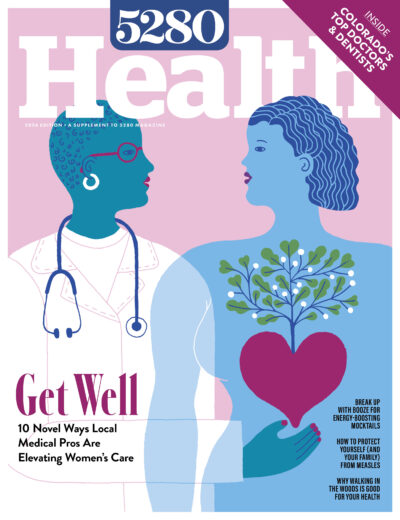The Local newsletter is your free, daily guide to life in Colorado. For locals, by locals.
Marissa Garcia describes her family as supportive, but mental health wasn’t something they discussed around the dinner table. So when she struggled with her emotional well-being in high school, she felt alone. “By overcoming that and piecing myself back together,” she says, “I just really became interested in the meaning behind what happened and the ‘whys.’ ” The 23-year-old Thornton resident’s search for answers led her to the Youth Mental Health Corps (YMHC), an AmeriCorps initiative that launched in four states, including Colorado, this past summer.
With 42 percent of high school students reporting persistent feelings of hopelessness and with suicide ranking as the second-leading cause of death among kids ages 10 to 14 in America, the youth mental health emergency isn’t burgeoning—it’s raging. To quell the epidemic, the YMHC is deploying, to middle and high schools as well as community health clinics, volunteers who have just been there: young adults (ages 18 to 24 at the start of service, with at least a high school diploma or the equivalent). They’ll assist young people academically and emotionally, meeting one-on-one with kids and connecting them and their families to mental health services that are available at their schools and in their communities. But first, YMHC workers will receive the training they need to ensure the help they provide actually, well, helps.
For decades, AmeriCorps’ members have received instruction in things such as how to operate chainsaws to build hiking trails, but that coaching wasn’t necessarily aimed at setting them up for success in future careers. YMHC participants will earn credentials they can put toward associate and bachelor’s degrees in a variety of mental-health-related fields. (The Schultz Family Foundation and Pinterest, which helped fund the initiative, chose Colorado as one of YMHC’s first four service areas because the Centennial State already has an educational framework in place that facilitates those types of accreditations.) And given that nearly 40 percent of AmeriCorps members pursue careers in the social sector after their service, proponents of the program hope it will fast-track the filling of what the U.S. Department of Health and Human Services says is a national shortage of more than 6,000 mental health practitioners.
More than 100 volunteers signed up in Colorado, about twice as many as expected, says Lieutenant Governor Dianne Primavera, whose office manages Serve Colorado, the state’s AmeriCorps affiliate. But it wasn’t only the offered certificates that created the outsize interest. When Primavera met with students to promote the program before its launch, the response was already overwhelming. “And I never even mentioned the credentials,” she says. “I think the youth realize there’s a crisis among their peers, and they want to use their skills to address it.” That’s true for Garcia, who signed up for YMHC unaware of the training she would receive. “I don’t know what my path looks like,” she says, “but having this in my back pocket, I feel like it’s going to be really beneficial, no matter what I do.”
Correction: An earlier version of this article incorrectly stated that AmeriCorps chose Colorado as one of YMHC’s first service areas.









